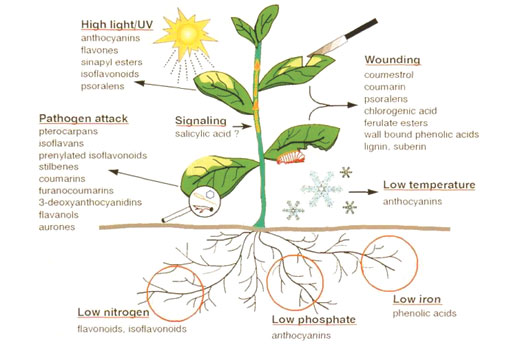Trials conducted during the last three years in Italy and New Zealand show the elicitor Agrizest can reduce the destructive impacts of Psa-V on kiwifruit vines and deliver higher orchard gate returns in the disease environment, says Nathan Balasingham, of Indigo Ltd.
(Image - Richard A. Dixon and Nancy L. Paiva 1995 American Society of Plant Physiologists Vol7 pp 1085-1097).
Nathan, who developed Agrizest, says it is not a cure for Psa but assists plant in their response to pests and diseases and environmental stress.
Nathan presented his research results at the Psa 2013 International Conference at Mount Maunganui last November.
The product helps plant to produce phenylpropanoids or essential oils, which are involved in protecting plants from light, ultra violet rays and heat damage, from mechanical, wind or hail damage; and from damage caused by low temperatures and by pests and disease.
'Phenylpropanoids also enable the plant to convert soil nutrients to a plant-available form. The phenolic hormone salicylic acid interacts with jasmonate and ethylene, and regulates the plants' repair, growth and defence system.”
A split block trial conducted using Agrizest in a highly susceptible Hort16A gold orchard in the epicentre of the Psa epidemic in New Zealand in 2010/2011, showed the elicitor treatment increased yield by 21 per cent compared to the control.
The market yield was much higher at 28 per cent, because the elicitor treatment also improved fruit quality. The net increase in returns to the orchardists was more than $17,000 per hectare. 'The increased yield was not at the expense of fruit size. A higher proportion of the increase in yield was in the larger fruit size grade,” says Nathan.
In a case study, a Katikati Hort 16A orchard which showed Psa disease symptoms in spring 2012 was successfully managed using Agrizest and Biozest with a record 22,000 trays per hectare in the low-diseased block, and 14,000 trays per hectare in the moderately-diseased block. The average fruit size was count 33, higher than in the industry average.
'The high OGR ($210,000/ha) has placed the orchardists in a strong financial position to replace the Hort 16A vines with a more resilient variety,” says Nathan.
Agrizest was also used on a seven hectare Hayward variety orchard in Aprilia, Italy, decreasing the impact of Psa on productivity. The orchard yield increased from 90 tonnes in 2010 to 280 tonnes in 2012.
'Trunk exudates decreased from 80 per cent to 60 per cent and in 2013 – only six vines had exudates and only on the laterals. The plants were under less stress and therefore the orchard saved on the irrigation bill by more than 500 Euros per hectare. The average fruit size also increased.”
Agrizest and Biozest used on newly grafted vines are helping achieve full canopy cover and production quickly.
Nathan says a G3 block, grafted in July, achieved full canopy cover by the following February.
Psa is a stress-induced disease. There is an excessive use of fertiliser in the kiwifruit industry in New Zealand, which has led to physiological diseases and salinity problems.
Applications of excessive potassium fertiliser locks up the magnesium in soil particles and prevents adequate uptake, into the foliage. During the second stage of the growth cycle, the scarce magnesium in mature leaves is trans-located into the young leaves. As a consequence, the older leaves suffer breakdown. High salinity in kiwifruit orchards is also resulting in premature leaf fall.
'Blocks treated with Agrizest are relatively free from leaf breakdown and premature leaf fall and have healthy productive leaves.”
The elicitor has also been shown to help overcome damage caused by spring frosts, helping restore a healthy canopy by blossom time.



0 comments
Leave a Comment
You must be logged in to make a comment.